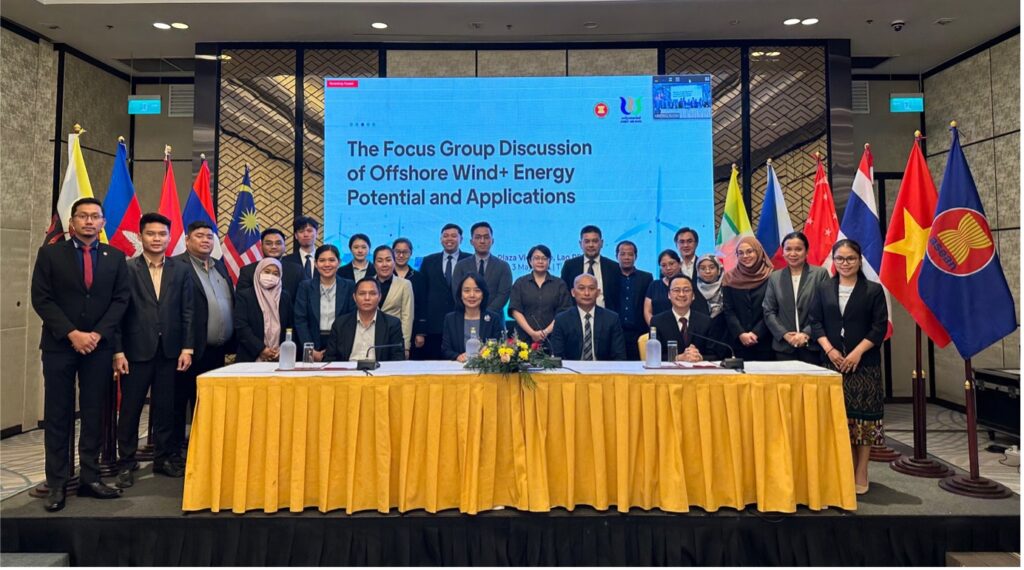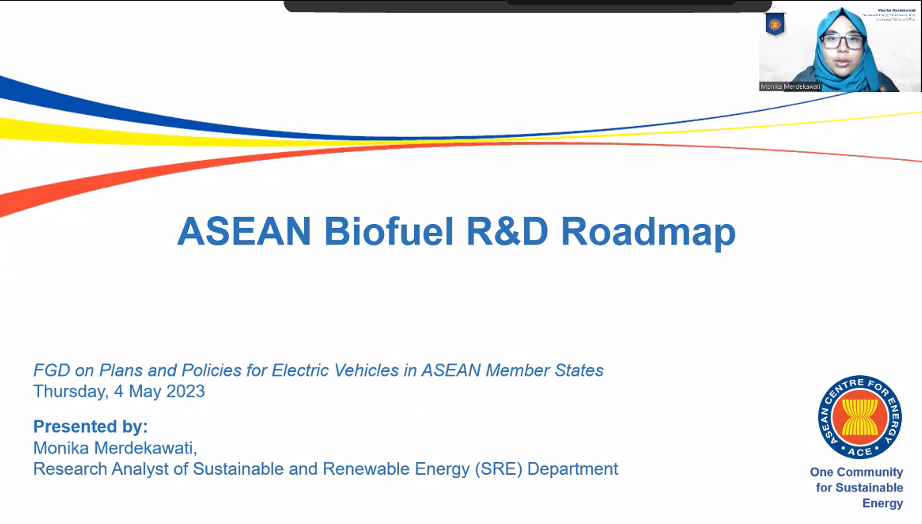Menu

Photo 1. The Group Photo of the Lao PDR Host, RE-SSN Chair, and representatives from ASEAN Member States, ASEAN Secretariat, Dialogue Partners, International Organisations, and ASEAN Centre for Energy (ACE) in the FGD on Plans and Policies or EV in AMS
On Thursday, 4 May 2023, the ASEAN Center for Energy (ACE) organised the ASEAN Focus Group Discussion on Plans and Policies for Electric Vehicles (EV) in ASEAN Member States (AMS) for Integration into Biofuel Roadmap at Crown Plaza Vientiane, Lao PDR. The event was a part of the 30th Regional Energy Sub-Sector Network (RE-SSN) Annual Meeting and its Associated Meetings.
The opening remarks were delivered by Mr Khammah Sopraseurth, Deputy Director General, Department of Energy Efficiency and Promotion, Ministry of Energy and Mines, Lao PDR; Dr Sumittra Charojrochkul, Executive Director, National Energy Technology Center (ENTEC), Thailand (virtually); and Mr Christopher G Zamora, Senior Manager of ACE.
In his opening remarks, Mr Christopher G Zamora, Senior Manager of ACE, emphasised the importance of this effort, stating that ASEAN is home to over 600 million people with a combined GDP of over 7 trillion U.S. dollars and energy consumption of over 400 million tons of oil equivalent. He highlighted that the project on strategic integration of EVs into the ASEAN Biofuel Roadmap is a crucial part of the ASEAN Center for Energy efforts and the National Science and Technology Development Agency (NSTDA) to develop plans and policies that support the integration of EVs.
The event’s first session was moderated by Ms. Ngoc Huong Giang Vu, Associate Research Analyst at the ASEAN Centre for Energy (ACE) and focused on integrating electric vehicles into the ASEAN Biofuel Roadmap.

Photo 2. Dr Nuwong Cholacoop’s presentation on the Integration of EV into Biofuel Roadmap study
Dr Nuwong Cholacoop, Director of the Low Carbon Energy Research Group (LERG) at the National Energy Technology Center (ENTEC), delivered a virtual presentation on this topic. In his presentation, the research and development (R&D) mapping was conducted for two biofuel types: ethanol and biodiesel. The project, set to last until November 2024, aims to establish policy dialogue on EVs for strategic integration into biofuel for the energy mix in the transport sector in the ASEAN Member States. The project includes conducting scenario analysis reflecting strategic integration of EV and biofuel-powered vehicles through FGDs with relevant government officials. This project is expected to contribute significantly to the ASEAN region’s efforts to reduce energy consumption and increase energy efficiency and conservation measures in the transportation sector.

Photo 3. Ms Monika Merdekawati’s presentation on the ASEAN Biofuel R&D Roadmap Study
Next, Ms Monika Merdekawati, Research Analyst at ACE, presented the ASEAN Biofuel Research and Development Roadmap. During Ms Monika Merdekawati’s presentation on the ASEAN Biofuel R&D Roadmap, she emphasised the criticality of supply chain management. She presented a schematic of the advanced biofuel supply chain networks, which involves all activities of the biofuel lifecycle from pitstop production to distribution and involves various ownership entities such as farmers, biorefineries, oil companies, and distributors. Ms Merdekawati highlighted that prioritisation in the supply chain governs the system’s design. Thus, it requires meticulous consideration as it will affect the overall efficiency of biofuel development.
Furthermore, she shared the findings that member countries focus on the upstream and give lower attention to other supply chain components, such as biofuel feedstock availability, production availability, and market size. She stressed that a collective approach is an essential step to accelerate biofuel. She proposed the ASEAN Biofuel R&D Roadmap to guide the collaboration between member states in creating a path for technology dissemination and knowledge transfer. With the growing demand from ever-increasing blending mandates, spouses, and national implementation targets, the importance of biofuel must be considered. Therefore, extensive identification by respective agencies in the ASEAN region will help accelerate the dissemination process and resolve the bottleneck of biofuel utilisation.

Photo 4. Mr Rizky Aditya Putra’s presentation on ASEAN Energy Efficiency and Conservation Measures for the Transportation Sector
Mr Rizky Aditya Putra, Senior Officer at ACE, presented on ASEAN Energy Efficiency and Conservation Measures for the Transportation Sector. He shared that the transportation sector is the second-highest energy-consuming sector in the ASEAN region, accounting for 34.7% of the total consumption and 72% of the other demand in 2020, as revealed by the ASEAN Energy Outlook. The dependency on imports may pose significant environmental and energy security issues for the region. Road transport dominates this sector, accounting for 94% of the sector’s energy consumption in 2020, with passenger vehicles representing a significant share of the energy demand. By 2050, passenger vehicles are expected to claim around 75% of the need, followed by trucks.
To tackle these challenges, under the ASEAN Plan of Action for Energy Cooperation Phase II (2021-2025), the region aims to achieve a 30% energy intensity reduction by 2025, based on 2005 levels, including encouraging energy efficiency and conservation efforts in the transportation sector. Two policies that have been globally proven to be impactful measures to reduce fuel consumption and local pollutants emissions are mandatory fuel economy standards and vehicle labelling. These policies have also catalysed vehicle manufacturers to develop newer, more efficient technologies.
Despite the existing policies, EV sales accounted for less than 1% of the total vehicle sales in the member states in 2021, and the 7th ASEAN Energy Outlook projected that the percentage may only reach 2.6% by 2030 and 10.6% by 2050. To boost the appeal of EVs, governments are providing various consumer-targeted incentives based on global best practices proven effective in increasing the deployment of EVs, such as in China, Europe, and other countries.
Proceeding to the next agenda, the closed sessions of the FGD, which Mr I Dewa Made Raditya Margenta from ACEmoderates and Mr Khemrath Vithean, Assistant Researcher, Renewable Energy and Energy Efficiency Research Team (RENT), Low Carbon Energy Research Group (LERG), National Energy Technology Center (ENTEC), focused on the presentations from the Republic of Korea’s representative on their experience in promoting and balancing the use of biofuel and EV, as well as from the AMS’ representativesa on their respective decarbonisation plan in the transportation sector. The closed sessions also verified the current version and existing data on the EV statistics of the project and further deep-dived into the policy actions to promote EV and biofuel-powered vehicles strategically.

Photo 5. Mr Khemrath Vithean’s presentation on the EV Targets and Statistics in AMS in the closed sessions
In the closing session, Mr Christopher G. Zamora, Senior Manager of ASEAN Centre for Energy (ACE), reflected on the valuable discussions held during the event. He highlighted member states’ growing interest and commitment towards integrating EVs into the biofuel road map. The adoption of EVs is gaining momentum in the region, but there is still work to be done, particularly in developing charging infrastructure and addressing battery technology and disposal. He emphasised the need for policies and regulations to support the adoption of electric vehicles. Mr Zamora stated that today’s discussion had been a step in the right direction towards implementing the Asian Plan of Action for Energy Cooperation Phase Two (2021-2025). He appreciated the ASEAN Member States and the Republic of Korea for their insights and feedback.
In conclusion, the ASEAN Focus Group Discussion on Plans and Policies for EVs in the ASEAN Member States for Integration into Biofuel Roadmap at the 30th RE SSN Meeting was an essential platform for ASEAN member states to discuss policy actions and strategies for promoting and balancing the uses of electric vehicles and biofuel. The discussions covered ongoing policy actions in each member state, the development of data templates, and the influence of local contexts on policy actions.
To learn more about the Electric Vehicles in ASEAN for Integration into Biofuel Roadmap, visit the links below.
1. The FGD on Plans and Policies for Electric Vehicles in ASEAN for Integration into Biofuel Roadmap
2. ASEAN Centre for Energy’s related recent publication
3. The 30th RE-SSN Meeting and other Associated Meetings:
